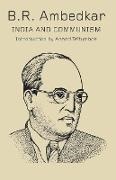Read more
Those who think that Babasaheb Ambedkar was against Communism or Marxism are grossly prejudiced. Ambedkar's relationship with Marxism was enigmatic. He defined himself as a socialist, not a Marxist. But he was impressed by the élan of the Marxist tradition.
However, it is also true that he had serious reservations about accepting certain theoretical postulations of Marxism. Vested interests amongst the Dalits, however, pitch Ambedkar firmly as the enemy of Marxism. The fundamental category of class, through which Ambedkar viewed human society, has therefore been a complete taboo. Communists, on their part, have responded in kind, attacking him and his ideas.
In the early 1950s, Ambedkar started work on a book he wanted to call India and Communism. The book was never finished. The present volume assembles what survives of this book, along with a section of another unfinished book, Can I be a Hindu?
Anand Teltumbde, in his hard-hitting Introduction, charts the course of Ambedkar's thinking on communism and Marxism, the historical reasons for the rift between him and the communists, and the basis on which a larger unity of Ambedkarites and communists can be forged. This unity, he argues, is an essential prerequisite for the emancipation of India's poor and oppressed.
About the author
Bhimrao Ramji Ambedkar (14 April 1891 - 6 December 1956), popularly known as Babasaheb, was an Indian jurist, economist, politician and social reformer who inspired the Modern Buddhist Movement and campaigned against social discrimination in India, striving for equal social rights or Dalits, women and labour. He was independent India's first law minister and the principal architect of the Constitution of India.
Ambedkar was a prolific student, earning a law degree and various doctorates from Columbia University and the London School of Economics, and gained a reputation as a scholar for his research in law, economics and political science. In his early career he was an economist, professor, and lawyer. His later life was marked by his political activities, where he became involved in the negotiations for India's independence campaigning by publishing journals advocating political rights and social freedom for untouchables and contributing significantly to the establishment of the state of India. In 1956 he converted to Buddhism, initiating mass conversions of Dalits. In 1990, Ambedkar was posthumously conferred with the Bharat Ratna, India's highest civilian award. Ambedkar's legacy includes numerous memorials and depictions in popular culture.

